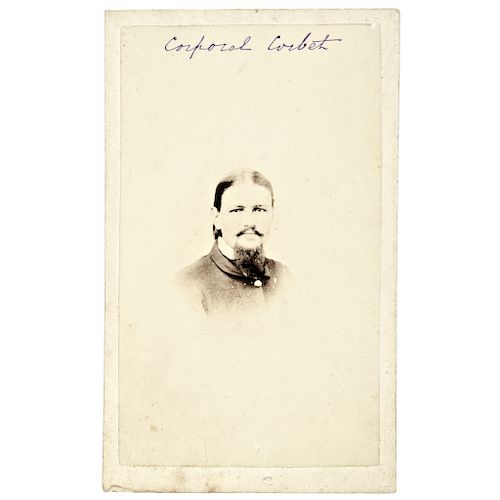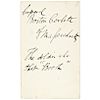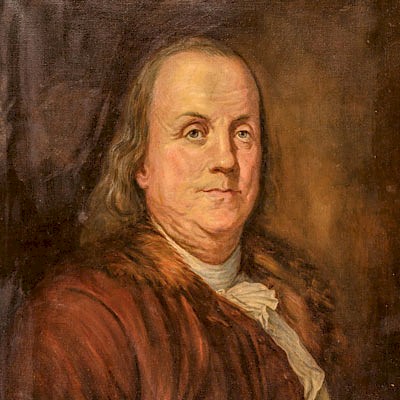CDV Photo of Thomas P. Boston Corbett the Soldier Who Killed John Wilkes Booth
Lot 249
Estimate:
$1,000 - $1,200
Absentee vs Live bid
Two ways to bid:
- Leave a max absentee bid and the platform will bid on your behalf up to your maximum bid during the live auction.
- Bid live during the auction and your bids will be submitted real-time to the auctioneer.
Bid Increments
| Price | Bid Increment |
|---|---|
| $0 | $10 |
| $200 | $20 |
| $300 | $25 |
| $500 | $50 |
| $1,000 | $100 |
| $2,000 | $200 |
| $3,000 | $250 |
| $5,000 | $500 |
| $10,000 | $1,000 |
| $20,000 | $2,000 |
| $30,000 | $2,500 |
| $50,000 | $5,000 |
| $100,000 | $10,000 |
| $200,000 | $20,000 |
| $300,000 | $25,000 |
| $500,000 | $50,000 |
About Auction
By Early American History Auctions
Aug 24, 2019
Set Reminder
2019-08-24 12:00:00
2019-08-24 12:00:00
America/New_York
Bidsquare
Bidsquare : Autographs, Colonial Currency, Political Americana, Historic Guns
https://www.bidsquare.com/auctions/early-american-history-auctions/autographs-colonial-currency-political-americana-historic-guns-4347
Historic Autographs • Colonial Currency • American Civil War Colonial Era • Revolutionary War • Political Americana • Black History Early American History Auctions auctions@earlyamerican.com
Historic Autographs • Colonial Currency • American Civil War Colonial Era • Revolutionary War • Political Americana • Black History Early American History Auctions auctions@earlyamerican.com
- Lot Description
Abraham Lincoln Related
Thomas P. "Boston" Corbett the Union Soldier Who Killed John Wilkes Booth With Civil War Period Identification
c. 1865 Civil War Era & President Abraham Lincoln Assasination Period, Carte de Visite Photograph of Thomas P. "Boston" Corbett, Soldier that Shot Lincoln's Assassin John Wilkes Booth, Choice Extremely Fine.
This original Identified Civil War Era CDV measures 2.5" x 4". Image shows a bearded soldier in uniform looking straight forward. Written in small violet ink at top of the image is "Corporal Corbet" (sic). There is no maker backstamp, yet handwritten upon the reverse side in a period hand in rich deep brown ink reads, "Corporal Boston Corbett of Massachusetts --- The Soldier who shot 'Booth.'" This is an impressive image of Corbett in a bust pose facing forward. There is some trivial expected tone at the extreme outer card edges, remaining clean and crisp with full margins all around. Thomas P. "Boston" Corbett (1832 - presumed dead 1894) was the Union Army soldier who shot and killed Abraham Lincoln's assassin, John Wilkes Booth. (Read much more info in our online catalog.)
Boston Corbett was one of 26 Union Soldiers chosen from the 16th New York Cavalry to pursue John Wilkes Booth after the latter assassinated President Lincoln.
Booth was cornered in a tobacco barn on the Virginia farm of Richard Garrett. The barn was set ablaze, but Booth remained inside. Corbett shot Booth through a crack in the barn wall, delivering a mortal wound from which Booth died several hours later.
Corbett was arrested for a short time after the shooting, but the charges were dropped and he received part of the substantial reward money that was offered by the government for the capture of John Wilkes Booth.
In April 1861, early in the American Civil War, Corbett enlisted as a private in Company I of the 12 Regiment New York Militia. He was discharged in August, at the end of the regiment's 3 month enlistment. Corbett re-enlisted in September 1863 as a private in Company L, 16th New York Cavalry Regiment.
Captured by Confederate Colonel John S. Mosby's men at Culpeper, Virginia on June 24, 1864, Corbett was held prisoner at Andersonville prison for five months, when he was exchanged. On his return to his company, he was promoted to sergeant. Corbett later testified for the prosecution in the trial of the commandant of Andersonville, Captain Henry Wirz.
Corbett was a member of the 16th New York Cavalry Regiment sent, on April 24, 1865, to apprehend John Wilkes Booth, the assassin of Abraham Lincoln, who was still at large. Two days later the regiment surrounded Booth and his accomplice, David Herold, in a tobacco barn on the Virginia farm of Richard Garrett. The barn was set on fire in an attempt to force them out into the open. Herold surrendered, but Booth remained inside. Corbett was positioned near a large crack in the barn wall. Corbett claimed in an 1878 interview that he saw Booth aim his carbine.
At that point, Corbett shot Booth with his Colt revolver despite Secretary of War Edwin M. Stanton's orders that Booth should be taken alive. Eyewitness Lieutenant Edward Doherty, the officer in charge of the soldiers who captured Booth and Herold, stated that "the bullet struck Booth in the back of the head, about an inch below the spot where his shot had entered the head of Mr. Lincoln." His spinal cord was severed, and he died two hours later.
Boston Corbett was immediately arrested for violation of his orders, but Stanton later had the charges dropped. Stanton remarked, "The rebel is dead. The patriot lives." Corbett received his share of the reward money, amounting to $1,653.84.
In his official statement, Corbett claimed he shot Booth because he thought Lincoln's assassin was preparing to use his weapons. This was contradicted by the other witnesses. When asked later why he did it, Corbett answered that "Providence directed me".
- Shipping Info
-
Early American provides in-house worldwide shipping. Please contact us directly if you have questions about your specific shipping requirements.
-
- Buyer's Premium



 EUR
EUR CAD
CAD AUD
AUD GBP
GBP MXN
MXN HKD
HKD CNY
CNY MYR
MYR SEK
SEK SGD
SGD CHF
CHF THB
THB












